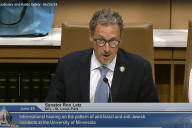You have /5 articles left.
Sign up for a free account or log in.
The guidance letters issued in recent years by the U.S. Department of Education’s Office for Civil Rights on how colleges should investigate and adjudicate cases of sexual assault are effectively -- and illegally -- acting as binding regulations, a Republican senator argues in a letter sent to the department today.
In a sharply worded missive, Senator James Lankford wrote that, while the department's two Dear Colleague letters on harassment and sexual violence sent to institutions in 2010 and 2011 “purport to merely interpret statements of existing law,” the letters actually enacted sweeping regulatory changes without first going through the required notice-and-comment procedures required by the Administrative Procedure Act.
The guidance, the senator argues, goes further than clarifying Title IX of the Education Amendments of 1972 -- it expands the gender discrimination law’s scope, increasing the liability for institutions dealing with bullying, harassment and sexual violence and relaxing the burden of proof institutions are required to use when adjudicating cases of sexual assault.
“Colleges and universities across the nation, in addition to prestigious legal scholars, government officials and members of the U.S. Congress, view the Dear Colleague letters as improperly issued guidance that require constitutionally questionable and ill-conceived policies -- policies that fail to accomplish our common regulatory goals of school safety and gender equality in education as required by Title IX,” Lankford, a Republican from Oklahoma and chairman of the Senate Subcommittee on Regulatory Affairs and Federal Management, wrote. “Here, I present to you an opportunity to correct the muddled record.”
He asked the department to issue a response by the end of the month that clarifies that “failure to adhere to the policies will not be grounds for” investigation or revocation of federal funding. “For me, these concerns are about more than policy disagreements,” Lankford added. “They are evidence that OCR’s Dear Colleague letters are not merely interpretive, but alter the regulatory and legal landscape in fundamental ways.”
During a Senate hearing in October, Ted Mitchell, the department’s under secretary, told Lankford that the “guidance does not hold the force of law and are recommendations and illustrations of ways in which [the department is] interpreting the statute and regulations.” Earlier that week, during a similar exchange with Senator Lamar Alexander, the Republican who chairs the Senate’s education committee, the department’s assistant secretary, Amy McIntosh, also stated that guidance “does not have the force of law.”
But critics like Alexander and Lankford argue that because the department threatens to pull federal funding of institutions that do not comply with the guidance, the policies have the teeth of binding regulations -- and that colleges and universities facing OCR investigations have too much at stake to push back against the guidance and the legality of the department's actions.
“Institutions would be on very solid ground in challenging OCR because OCR’s statements and policies clearly skirted the notice-and-comment requirements,” said Joseph Cohn, legislative and policy director at the Foundation for Individual Rights in Education. “If not following the guidance and advice carries a consequence, then you’re not in the realm of guidance and advice anymore. But the problem is schools have no incentive to be the test case. Whether OCR is off by an inch or a mile, there’s simply too much at stake for any university to stand up against it, and that’s a really unhealthy dynamic.”
Not all legal experts are so confident of the illegality of the Office for Civil Rights’ guidance, however. Erin Buzuvis, a law professor at Western New England University and director of the university’s Center for Gender and Sexuality Studies, said the Dear Colleague letters do “qualify as an interpretation of an existing regulation” as they clarify language that Title IX previously left vague.
Title IX requires colleges and universities to provide “a prompt and equitable response” to complaints of sexual harassment and sexual assault. The department’s guidance offers up a clarification about what exactly constitutes such a response, Buzuvis said.
“The letter takes those words -- ‘prompt and equitable response’ -- and gives them a specific meaning,” she said. “The department already had the enforcement authority to bring enforcement action against an institution for violating Title IX, because that regulation did go through notice and comment in the 1970s. The department could have chosen to exercise that option for the guidance, as well, but that takes a lot of time. All the letter does is say to colleges, ‘You’re not getting the message, so we’re going to tell you in advance what the compliance standard is, so if you want to avoid an enforcement action, this is how you do it.’ It's important to get that message out there as quickly as possible.”
There is a drawback to defining Title IX in this fashion rather than going through a notice-and-comment period: another administration has the ability to later turn back the clock on whatever the nonbinding guidance states. In 2010, the current administration revoked a controversial 2005 Title IX clarification issued under President George W. Bush that only allowed institutions to use Internet or email surveys when determining female students’ interest in athletic participation. The 2005 guidance had similarly wiped out a 1996 clarification issued under President Bill Clinton.
“The benefit is that you can avoid the cumbersome process of the notice-and-comment process, but it’d be more durable if it existed in the form of regulation,” Buzuvis said. “Letters can be much more easily revoked. That's the trade-off. Easy come, easy go.”








